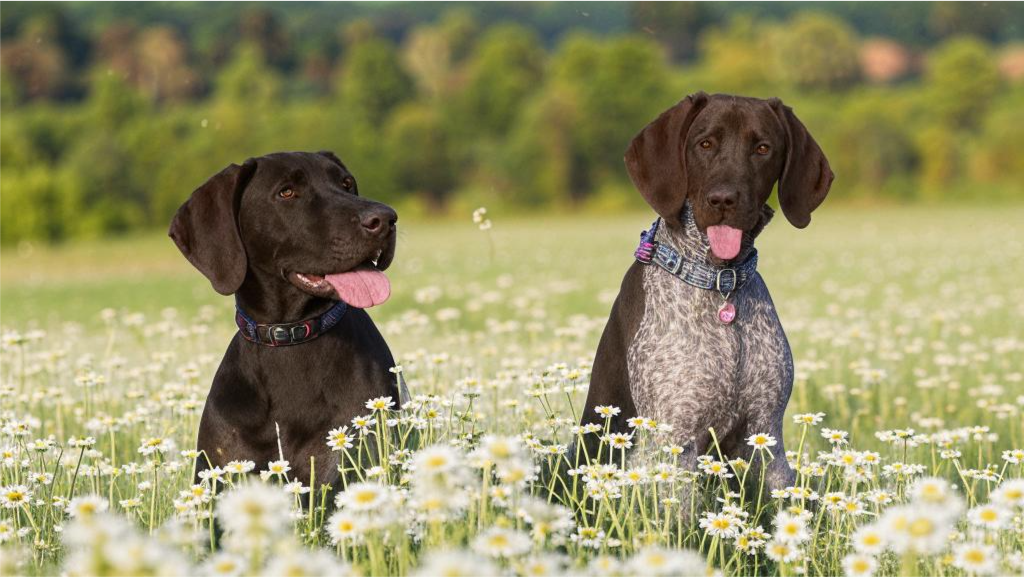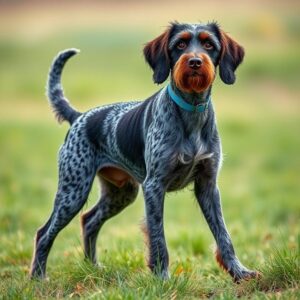German Wirehaired Pointer Compared to Top Hunting Breeds
German wirehaired pointer is often the first name that comes up when hunters talk about reliable, all-terrain bird dogs. Built for rugged work and harsh weather, this breed blends drive, smarts, and stamina like few others. But is it really the best option out there? In this guide, we’ll compare the German Wirehaired Pointer to other top contenders—like the German Shorthaired Pointer (GSP), Wirehaired Pointing Griffon, and German Longhaired Pointer. From waterfowl retrieves to upland pursuits in places like Colorado, we’ll break down temperament, hunting style, and performance so you can choose the right dog for your needs.
The All-Terrain Specialist: German Wirehaired Pointer
The German Wirehaired Pointer wasn’t just bred to point—it was designed to hunt in rugged European conditions. With a dense, wiry coat that shrugs off burrs and ice, webbed feet that cut through cold lakes, and a mind wired for tracking and retrieving, this breed thrives in just about every hunting scenario. Whether it’s chasing upland game in dry plains or diving into icy waters for waterfowl, the GWP gets the job done.
Unique Attributes:
- Strong wirehaired pointing instinct
- Weather-resistant double coat
- High endurance and scenting ability
- Excellent swimmer thanks to webbed feet
Hunters in demanding states like Colorado often list the GWP as the best pointer breed for Colorado—a testament to its rugged build and adaptability to changing altitudes and weather.
Side-by-Side: GWP vs. GSP, Griffon & Longhaired Pointer
To get a clearer picture, let’s compare how the German Wirehaired Pointer stacks up against other high-performing hunting breeds.
Comparison Table 1: Performance & Adaptability
| Breed | Waterfowl Ability | Upland Bird Hunting | Cold Weather Endurance | Grooming Needs | Energy Level |
|---|---|---|---|---|---|
| German Wirehaired Pointer | Excellent | Excellent | Superior | Moderate | High |
| German Shorthaired Pointer | Good | Excellent | Moderate | Low | High |
| Wirehaired Pointing Griffon | Excellent | Very Good | Excellent | High | Medium |
| German Longhaired Pointer | Good | Good | Good | High | Medium |
Each breed excels in its own right, but only the GWP brings together a high drive, weather resistance, and agility in tough terrains. When comparing the GWP vs. GSP for waterfowl, for instance, the GWP’s coat and endurance give it a distinct edge in cold-water retrieves.
GWP vs. Other Pointers: Hunting Style & Temperament
GWP vs. GSP
- GWP: Bred for harsher environments, better suited for multi-purpose hunting in varied terrain.
- GSP: Quicker on open ground, more social, easier to train for new hunters.
GWP vs. Wirehaired Pointing Griffon
- GWP: More independent, assertive in the field.
- Griffon: Softer temperament, often better suited for family environments.
GWP vs. German Longhaired Pointer
- GWP: High-drive, rugged, aggressive tracker.
- Longhaired Pointer: Graceful, steady gait, less driven but elegant in open fields.
Strengths of the German Wirehaired Pointer
The GWP is particularly strong in domains where adaptation and tenacity are essential. In this particular area, this breed really shines:
For upland game hunting, the wiry coat provides protection in thickets that are dense. The GWP is able to sneak underneath cover while maintaining its keen sense of smell.

When it comes to retrieving waterfowl, freezing ponds and cold lakes are not a problem. A greater resistance to cold is exhibited by the GWP in comparison to the shorthaired pointer.
The GWP is able to easily track larger injured wildlife thanks to its high scenting abilities and strong prey drive. This skill allows it to track them with ease.
Climate Resilience: Hunters who are seeking for the greatest pointer for Colorado frequently rely on the GWP’s coat, stamina, and altitude endurance while searching for the pet.
Comparison Table 2: Temperament & Trainability
| Breed | Temperament | Trainability | Independence | Family Compatibility | Bark Level |
|---|---|---|---|---|---|
| German Wirehaired Pointer | Confident, alert | Moderate | High | Good with training | Moderate |
| German Shorthaired Pointer | Friendly, outgoing | High | Medium | Excellent | Low |
| Wirehaired Pointing Griffon | Calm, eager to please | High | Low | Excellent | Low |
| German Longhaired Pointer | Gentle, even-tempered | High | Medium | Excellent | Low |
Bullet List: Pros of the German Wirehaired Pointer
- Adaptable to upland, waterfowl, and big game hunting
- Rugged coat withstands tough environments
- Suitable for high-altitude and cold climates
- Smart and independent—great for experienced handlers
- Strong swimmer with excellent retrieve drive
Who Should (and Shouldn’t) Choose a GWP?
Ideal Owner
- Experienced hunters who appreciate a best pointer breed that can handle it all
- Outdoorsmen in states like Colorado with varied terrain
- Owners who want lower grooming demands compared to Griffons or Longhaired Pointers
Less Ideal For:
- First-time dog owners—the GWP’s independence can be misread as stubbornness
- Families looking for a calm, low-drive pet
The GWP isn’t just a pointer—it’s a specialist in being good at almost everything. But that also means it needs the right kind of owner. This isn’t a dog that wants to be bored or sidelined.
Final Thoughts
When comparing the German Wirehaired Pointer to other top breeds, it’s clear this dog isn’t just built for performance—it thrives in tough situations where other breeds might falter. Whether you’re evaluating the GWP vs. GSP for waterfowl, weighing Griffon temperament against independence, or considering the German longhaired pointer hunting style, the GWP holds its ground—and often excels.
For hunters needing a dog that can tackle rugged uplands, icy waters, and everything in between, the German Wirehaired Pointer remains a top-tier choice in the field.


